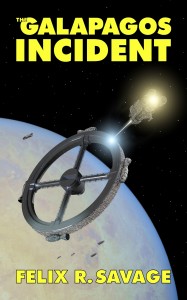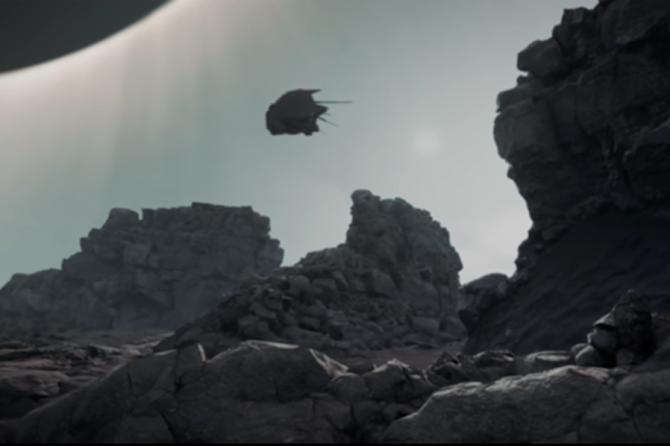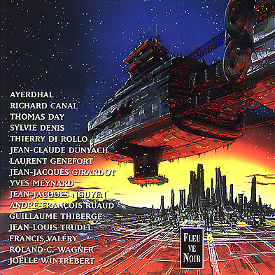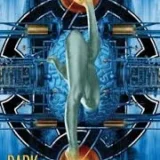 The Galapagos Incident
The Galapagos Incident
Chapter 20
On the bridge of the Kharbage Can, captains Okoli, Kim, and Sikorsky were enjoying breakfast. Perhaps it was a little much to say that Sikorsky was enjoying it. He was not handcuffed; Lieutenant Johnson had been reprimanded for excessive zeal—but the presence of Johnson and several other armed officers on the bridge served as a reminder that Sikorsky was officially in custody.
Kim drank coffee. Okoli surreptitiously spiked his own coffee with Bailey’s Irish Cream from a pouch labelled SWEETENER. Sikorsky picked at an egg and ham calzone.
Also on the table were danishes, bagels, gooseberry and lingonberry preserves, smoked salmon, cream cheese, wedges of shrimp and mushroom quiche, and a selection of freeze-dried fruits. Most of the food had arrived on the table via the Can’s deep freeze, but the baked goods had come in dough form and been finished off in the oven by the Can’s cook, the former proprietor of a French-Vietnamese restaurant on Pallas.
“Once upon a time, people thought that cheap fusion would usher in an era of plenty. Now we know there is no such thing as a post-scarcity economy,” Kim said, smiling so widely that his eyes nearly vanished. “But you, Captain Okoli, almost convince me otherwise.”
Okoli boomed a laugh. “Someone’ll always own the means of production. But these days it’s almost as profitable to own the means of recycling.”
The Cheap Trick officers swallowed saliva and fingered their guns. Okoli’s executive officer, seated at the Operations Control station, chomped a danish. A hand-holding pair of blue berets, members of the UNVRP peacekeeping detail, wandered in and helped themselves to coffee. The contrast between them and the Cheap Trick officers cried out for explanation. Part of the explanation was that the peacekeepers were not Space Force: they tended to be recruited piecemeal from the brokest militaries on Earth. The rest of the explanation was six months on the Kharbage Can.
“Business is good?” Kim enquired.
“Never better,” Okoli said. But that was a stretch even for him. “Until last week,” he added, more honestly.
“We’ll give you any assistance we can, of course, in the battle to save Botticelli Station.”
“Much appreciated.”
“Eef you veesh to save the station,” Sikorsky broke in, “you veel let me pilot it out of the gravity vell.”
“What was your rank at retirement, Captain?” Kim asked.
“Lieutenant-commander,” Sikorsky admitted.
Kim smirked. Okoli, hoping to head off a spat, said, “In the private sector, of course, we don’t have ranks. We figure a pilot’s ability based on results and reputation.”
.”Ah, reputation. A subjective metric.”
“Pretty reliable at weeding out the cowboys. Anyway, it’s all you got when the system is swarming with unlicensed recycling outfits, water bandits, and fly-by-night mining operations run by a man and his robot. Say what you will about the free market, the cream rises to the top.”
“Some say that the scum rises to the top,” Sikorsky put in.
“I may be scum,” Okoli said, grinning pleasantly at him, “but at least I look out for my people.”
Kim said thoughtfully, “If Botticelli Station can’t be saved, it’s not impossible to imagine that the Venus Remediation Project itself might be suspended or cancelled.”
Not only was this not impossible to imagine, everyone present already took it as a certainty.
“How great an—ah—ah—would Kharbage LLC suffer, Captain?”
“Thinking about a bit of insider trading?” Okoli joked. “You’re too late. Our stock’s already dropped thirty percent. If you take my advice, now’s the time to load up. The stock market thinks we’ll be dead in space if we lose our contract with UNVRP. I can tell you that’s wrong. Every asteroid that UNVRP has rejected hitherto, and they’ve been rejecting more than they acquire in the last few years, we’ve found a buyer for. Adnan Kharbage is a businessman par excellence. Our contract gives UNVRP the right of first rejection on whatever we find, but oftentimes we make more money if they reject it, by selling it on to someone else.”
Kim poured himself some more coffee and absently stretched out his hand for the pouch marked SWEETENER. Okoli moved it out of his reach. Settling for MILK, Kim said, “What about this—ah, ah, ah—asteroid that UNVRP is, or was, considering at the moment?”
“Lots of those. We’ll find buyers for them all, don’t you worry, in the sad event.”
“The unusual one,” Kim said, turning red. “Named for, ah. Turtles. Darwin. Ah.”
“Oh, that one,” Okoli said. “11073 Galapagos.”
In relief, Kim took a swallow of his coffee. He choked. His cheeks bulged. MILK had actually been pernod. Sikorsky let out a bellow of laughter. Okoli removed Kim’s cup, apologizing fluently, and substituted a new one. He was not sorry for the interruption. He had had the feeling for the last few minutes that he was being pumped, and he didn’t like it.
Not even his unexpected encounter with the peacekeepers’ mislabeling scam, however, distracted Kim from pursuing the topic. “So you do have an offer for that, ah, asteroid, Captain?”
“Oh, yes.”
“You understand that Space Force is concerned about the safety of its—ah—ah—population.”
Okoli stared. So did Sikorsky. Was it possible that Space Force did not realize that the population of 11073 Galapagos, in all probability, would shortly be exterminated by the PLAN?
Hiding his anger, Okoli played along. “No need for concern, Commander. Our customer has offered to guarantee the population’s safety and wellbeing, if they purchase the asteroid.”
“I wonder if that customer is someone we know?” Kim mused aloud.
Okoli set down his coffee cup with a deliberate clink. “Commander, forgive me, but you’re not cut out to be an intelligence operative. If the Navy wants to investigate the business dealings of a private company, they should get a court order, or send someone who’s better at weaselling information out of people. That’s not a slur on you. It’s a compliment to your integrity.”
Kim stopped smiling. After a moment, he said. “Thank you. I find this sort of thing repellent, to be honest. But the Admiralty is concerned about the possibility that someone’s leaking information to the PLAN.”
“Well, it’s not our customer,” Okoli said. “And it’s certainly not us.”
Sikorsky said, “I know who eet ees.”
Both men turned sharply. “Who?” Kim said.
Sikorsky shook his head. “I veel save that for my defense.” Smiling, he bit into a freeze-dried strawberry.
Kim cleared his throat. He glanced at his officers, who came to attention.
At that moment, a choked squawk issued from the far side of the bridge.
Okoli swung. “What’s up?”
The executive officer of the Kharbage Can, Richard Windsor, waved him over urgently. Windsor was an immensely fat man. He did not have a double or even a triple chin, just one chin that descended in a robin’s-breast swoop to the hirsute expanse of chest revealed by his gaping shirt. No one could make Windsor put on a uniform. But as the Cheap Trick officers gathered around the flight operations station, Okoli forgot about the sordid impression his exec must be making on the Space Force men and women. He stared aghast at the screen that showed a feed from the Can’s optic sensors.
Windsor still had half a danish in his mouth. He chewed, spattered crumbs down his front, swallowed. “It’s gone!”
“I can goddamn see that,” Okoli shouted. “When did it go?”
“Just now!”
“Ah,” Kim said. “Ah, ah, ah.”
Lieutenant Aimée Johnson forgot herself again. She shouted, “Our motherfucking ship!”
Windsor gestured with shaking, crumby fingers. The main screen switched to a radar plot. A green dot was the Cheap Trick, moving away.
“Present acceleration estimated at 0.2 gees,” Windsor said. “Their exhaust cone is washing over us now!”
LEDs sparkled as the Can’s sensors reacted to the hot ions spewing from the Cheap Trick’s fusion drive. Okoli lunged for the nearest console and ran the visual feed in reverse. Three spacesuited figures emerged from the Cheap Trick. They spacewalked backwards to the Can’s quarterdeck airlock, using the tethers as guides. The tethers were there only for that purpose. They weren’t strong enough to join the two ships, which were travelling in precisely synced orbits. Or had been, until a few seconds ago.
Okoli turned on Windsor. “Why didn’t you goddamn see them? You were too busy stuffing your face, ambling over to get another goddamn pastry!”
Kim seized the exec’s radio without asking permission. He punched in a military frequency and yelled, “Stop, thief! Come back! Kliko, you rat. You’ll be court-martialed for this!”
“We could catch them,” Okoli said. “Maybe. It would mean leaving the Superlifters, leaving the station.”
Kim shook his head, lips tight. He knew his own ship.
Windsor confirmed it. “They’re still accelerating,” he stammered. “Delta-V is 300,000 … 320,000 meters per second!”
Okoli eyed Kim. “Didn’t I hear something about the Heavypickets being fitted with spendy new drives?”
****
“Hydrogen-boron fusion,” Second Lieutenant August Kliko confirmed. “S-same exhaust signature as He3-deuterium—similar enough, anyway, that you wouldn’t notice the difference unless you were looking for it. Both are types of aneutronic fusion. There’s no nasty dangerous neutron radiation streaming out behind us. B-but hydrogen-boron requires much higher plasma temperatures within the tokamak. Advances in c-containment technology have only recently made it possible.”
“What difference does it make?” Elfrida yelled.
“W-well,” Kliko said, “it means we can go faster.”
Kliko was tied to his couch with bungee cords. They had found him playing zero-gee tennis against the ship’s computer and had easily overpowered him and convinced him to share the hub access codes. Those he did not know, dos Santos had unearthed without much difficulty. Kliko now sat in the co-pilot’s couch, still in his tennis whites, the fawn material of the couch darkened by his sweat.
The bridge of the Cheap Trick was the size, literally, of a tennis court, configured for freefall, with no floor. Ergoforms bobbled on stalks attached to desks that ran on interlocking spherical tracks, so that the seated officers could always be optimally aligned to the ship’s axis of acceleration. This contraption, known as a gyrosphere, hung in a web of bungee cables above dunes of bulkheads and lockers labelled in Cyrillic script.
Petruzzelli yelled, her gaze glued to the terrifying spread of screens surrounding the pilot’s desk, “Just tell me if there’s anything I need to know that would affect maneuvering capability. Such as, this drive uses up its fuel a lot faster.”
“Oh, no,” Kliko said. “It’s really fuel-efficient. I guess the big thing is that you can switch into plasma exhaust mode. Meaning that you don’t inject propellant into the plasma, so it stays hotter, and you go faster. But you’ve already figured that out.”
“You what what exhaust mode what?”
“We’re running in plasma exhaust mode now,” Kliko said, his eyes bulging. “I thought you knew that.”
Elfrida had already begun to feel inertial pressure on her body. Dizziness gripped her skull. The gunner’s couch on which she curled tried to compensate by tilting her into a prone position aligned with the ship’s axis of thrust. Face down, she straightened her legs with difficulty. The decal over the gunner’s display screen—THERE ARE 2 TYPES OF PEOPLE IN THE WORLD: GUNNERS AND TARGETS—blurred.
“Decrease acceleration,” dos Santos shouted. “This boat doesn’t have any built-in safety limits!”
“Oh yes, it does,” Kliko croaked, as soft robot arms snaked around from behind Elfrida’s couch. They probed at her face, seeking her nostrils. “The system will inject oxygenated gel into your lungs to prevent them from collapsing. But, well, you’re supposed to have nanotic skeletal reinforcement, too. Only a few Marines do. That’s why we’ve never actually used this thrust mode yet.”
Elfrida turned her face impulsively to escape the probing arms. She tried to raise her arms to ward them off. It felt like lifting dumbbells, but the dumbbells were her hands.
“I’m reversing thrust,” Petruzzelli screeched. “Firing attitude adjusters now. Stand by.”
The Cheap Trick flipped over. It took several minutes, they were going so fast. During this laborious battle between the main drive and the attitude adjusters, the artificial gravity generated by the ship’s still-increasing acceleration increased to a full 5.6 gees before levelling off and declining. Elfrida came round from a momentary blackout to find robotic fingers up her nose. She jerked away, screaming, “Ow,” and fell back on her couch as if she weighed 100 kilograms, which at the moment she did.
Kliko was still passed out. Petruzzelli was wrestling with the pilot’s console, while dos Santos leaned across the gap between their couches, rapping out suggestions and criticism. Knickknacks, locker doors, and pieces of console housing wallpapered the forward bulkheads in a mosaic of shards. The bridge fixtures of the Cheap Trick had not been updated to cope with the huge specific impulse of its new drive. Elfrida supposed they were lucky the ship itself hadn’t broken up.
“The good news,” Petruzzelli said shakily, “is we just covered more than half of the distance to 11073 Galapagos.”
“So we might get there … before the PLAN?” Elfrida thought about that. “Yowch.”
“The bad news,” said Petruzzelli, “is I’m going to have to decelerate hard all the rest of the way, or we’ll overshoot this asteroid at the speed of sound. So, when we get there, we’re not going to have very much fuel left for maneuvering.”
To read the other chapters of THE GALAPAGOS INCIDENT, click here.










